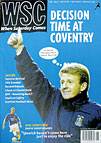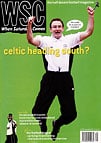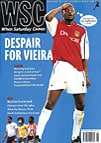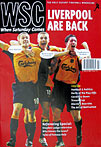 Ipswich, everyone's favourites to go down at the start of the season, look like ending it with the fair play title, manager of the year, golden boot and a place in Europe. Csaba Abrahall and Gavin Barber asked chairman David Sheepshanks where it had all gone right
Ipswich, everyone's favourites to go down at the start of the season, look like ending it with the fair play title, manager of the year, golden boot and a place in Europe. Csaba Abrahall and Gavin Barber asked chairman David Sheepshanks where it had all gone right
Despite the success of this season, clubs like Ipswich cannot guarantee a perennial Premiership place. How difficult is it to plan for the future bearing in mind the financial gap between the Premiership and the Football League?
It’s not difficult to plan for the future but it’s more difficult to implement it. Five or six years ago, we sat down and I said: “Can we get back into the Premiership next season?” Everyone’s heads went down. “Can we get back into the Premiership the year after?” You know, “Who’s he?” “What about five years?” And they began to say yes, they thought we could. I said “Why?” and the first thing was youth, because by then the development of players from the youth team could have come to fruition and all the other component parts to it. Out of that was born a long-term plan. It wasn’t just the youth, it was the commercial management, the community, the press relations, the way in which we looked after our customers, our sense of ambition – being able to be more up front about what our aims and objectives were, not to live with this old-fashioned idea that there’s no crisis at Ipswich unless the wine runs out in the boardroom, which I felt wore really thin with the supporters – and I’m a supporter. The reason I came on the board in 1987 is because I wrote to [then chairman] Patrick Cobbold. I was a season ticket holder and said that I thought the PR of the board and the way in which the club was being run was terrible. I felt the whole situation was just drifting. This was after 17 great years of First Division football and European glory. I’ve always felt we’ve got to wear our ambition a bit more on our sleeves. It doesn’t mean we have to let go of the traditional values and high standards and friendliness as a football club, but we’ve got to really mean business. So that resulted in a plan being born, the five-year plan that everyone knows about. It wasn’t difficult to make the plan, it was much more difficult to implement it, because every year we were having to shoot ourselves in the foot by selling players. We had to make unpopular decisions. Although I’m a fan, I’m also responsible to the supporters, the shareholders and everybody else, as are my fellow directors, to look after the health of the club and to try and make the decisions that are in the best interests, short and long-term. So much of football is about short-term glory which leads so often to boom and bust. We’re not about that. That’s not down to me, this is a phenomenal team effort by everybody who’s worked for this football club. I certainly haven’t worked for the last six years to see this disappear in a puff of smoke. We’ve worked to get into this position so we can go on to make it even bigger and even better.
Read more…
 Two fans debate over whether Sol Campbell's controversial move from Tottenham to north London rivals Arsenal was a betrayal
Two fans debate over whether Sol Campbell's controversial move from Tottenham to north London rivals Arsenal was a betrayal 

